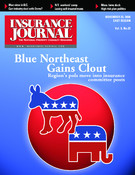European PLUS D&O conference panelists say D&O claims and the demand for coverage are going global
Nortel Networks – $2.4 billion settlement; Royal Ahold – $1.1 billion settlement; Vivendi Universal – billion dollar settlement pending. None of these companies are U.S.-based (they are Canadian, Dutch and French respectively), yet they were all sued and paid their settlements in the U.S. While D&O claims amounted to only about 10 percent of the final total, $240 million and $110 million is still a lot of money.
Aggrieved plaintiffs seek U.S. jurisdiction because U.S. law is more developed than elsewhere and the settlements/verdicts are far larger. U.S. courts, however, have to decide whether there’s enough “presence” in the U.S. to ground a decision to accept the lawsuit.
“If the stock is registered in the U.S. or traded on a U.S. exchange, there’s always jurisdiction,” explained William Lerach, a San Diego-based lawyer, at the Professional Liability Underwriting Society’s one day conference in October, at the Grange City Hotel in London. The conference marked the first “European D&O Liability Forum” PLUS has held across the Atlantic.
Harder problems are posed when neither of those elements is present. Nick Foord-Kelcey, managing director and D&O practice leader of Marsh’s FINPRO Practice Europe, explained that two tests are used: 1) the effects test; 2) the conduct test. In the first instance the court determines “if the defendant’s acts in the U.S. had ‘substantial adverse effects’ on U.S. investors.” Under the conduct test, the court determines if “the alleged wrongful acts were committed in the U.S., were substantial, and were more than merely preparatory to actions which occurred outside the U.S.”
Class actions drop, recoveries increase
Although there’s actually been a decline in class action suits over the last two years — due, according to Lerach, to the robust economy and the gains in the stock market — the size of the recoveries has increased. The number of lawsuits will probably go up if the economy cools and/or the stock market begins to slide.
The primary injured parties in class action lawsuits are no longer individual investors, but major stakeholders.
“Institutional investors [pension funds, mutual funds, etc.] are now filing lawsuits,” Lerach said. “They may sue in their home countries, or they may go to the U.S.” He explained that as a result it becomes very complicated to achieve a settlement of all claims on a worldwide basis.
Different laws apply
There are major differences between jurisdictions. Foord-Kelcey noted that not all European countries have statutes that allow class actions, although more and more countries are passing enabling legislation to do so. European legal systems do not permit contingent fees and most European Union legal systems require the loser to pay the winner’s costs of litigation, which in D&O cases is substantial. On the other hand most European jurisdictions do permit suits based on negligence, i.e., it’s not necessary to prove outright fraud in order to prevail. U.S. courts generally stick to the “business judgment rule,” and do not hold officers or directors legally responsible simply for making a mistake that cost the company and its shareholders money.
Major securities cases aren’t going to go away, but more of them may be filed in Europe, as the E.U. and other countries adopt more American style remedies. Meanwhile, the U.S. court system continues to offer an alternative forum. “They [European companies] like our system when they want to use it, but they don’t like it when it’s used against them,” Lerach said.
Lerach may be more pessimistic on issues of corporate governance than most people. He tends to see fraud, or potential for fraud, almost everywhere, but then that’s his business. He doesn’t think much of regulations and regulators either. Asked about “Sarbox” [Sarbanes-Oxley], he observed that “checking boxes is not a deterrent.” Ultimately, “honesty in companies is a matter of character,” Lerach concluded.
Globalization
The term “globalization” describes the accelerating trend among major companies to expand well beyond their borders to do business in countries around the world. Insurers and reinsurers have been among the leaders in opening subsidiaries and branch offices. Therefore it’s not surprising that corporate responsibility — in the form of claims against officers and directors — has followed this global expansion.
Those claims in turn have produced a rising demand for D&O coverage. The need will only increase as foreign jurisdictions, especially in the E.U., continue to update their laws on corporate governance to align them more closely with those in the U.S., which provide investors with greater protection.
“The E.U. is proposing to harmonize and codify the laws on corporate responsibility,” said Matthew Allen, a partner in Eversheds, a London law firm. “They [the European Commission or E.C.] want to strengthen shareholders rights, sort out the problems of cross border transactions, guarantee more and better corporate transparency and more frequent financial reporting.”
The list goes on, but one theme emerges. Officers and directors of E.U. companies are going to have to accept “greater personal responsibility,” and they will be held to increasingly higher standards of accountability.
D&O underwriters will continue to see the demand for their products increase. “Brokers, lawyers and risk managers should work together,” said Michael Rossi, president of the Los Angeles-based Insurance Law Group. “There’s an extreme disparity in skill sets,” he added. “Brokers need the ability to analyze, to see the risks for officers and directors. Right now many [brokers] just don’t have those skills.”
Was this article valuable?
Here are more articles you may enjoy.


 Insurance Broker Stocks Sink as AI App Sparks Disruption Fears
Insurance Broker Stocks Sink as AI App Sparks Disruption Fears  Viewpoint: Runoff Specialists Have Evolved Into Key Strategic Partners for Insurers
Viewpoint: Runoff Specialists Have Evolved Into Key Strategic Partners for Insurers  US Supreme Court Rejects Trump’s Global Tariffs
US Supreme Court Rejects Trump’s Global Tariffs  Florida Engineers: Winds Under 110 mph Simply Do Not Damage Concrete Tiles
Florida Engineers: Winds Under 110 mph Simply Do Not Damage Concrete Tiles 


